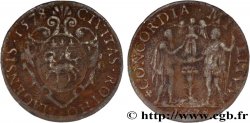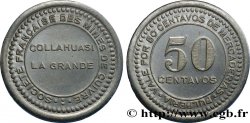fjt_728582 - ROUEN (VILLE DE...) Jeton Lt 27, Henri IV 1599
недоступный.
Товар уже продан в нашем интернет-магазине (2023)
Цена: : 60.00 €
Товар уже продан в нашем интернет-магазине (2023)
Цена: : 60.00 €
Тип Jeton Lt 27, Henri IV
Дата: 1599
Металл: brass
Диаметр: 27,5 mm
Ориентация осей монеты: 6 h.
Вес: 5,54 g.
Век: lisse
Редкость: R2
Комментарии о состоянии
Usure régulière. Très bel exemplaire
Ссылки в каталоге: :
Происхождение:
Exemplaire provenant de la Collection MARINECHE
Лицевая сторона
Аверс: легенда: +. CIVITAS ROTHOMAGENSIS 1599..
Аверс: описание: Écu aux armes de Rouen dans une couronne formée de deux branches de laurier.
Аверс: перевод: (Ville de Rouen).
Обратная сторона
Реверс: легенда: * DEVS. NOBIS. HÆC. OTIA. FECIT.
Реверс: Описание: Laboureur allant à gauche ; au fond, un berger se présentant à Jupiter sous le mot PNYX en lettres grecques.
Реверс: перевод: (Dieu a fait pour nous ces temps de paix).
Комментарий
La ville de Rouen est revenue à Henri IV après le paiement d’une énorme somme au gouverneur catholique en 1593. Une importante réunion de notables se tient à Rouen en 1596 où Pomponne de Bellièvre propose un plan d’assainissement des finances, de nouvelles taxes sont proposées par Rosny, futur Sully. Le revers évoque la paix revenue et la reconstruction qui a lieu dans la ville. L’édit de Nantes est enregistré au Parlement de Paris, le 25 février 1599.
The city of Rouen returned to Henry IV after the payment of a huge sum to the Catholic governor in 1593. An important meeting of notables was held in Rouen in 1596 where Pomponne de Bellièvre proposed a plan to reorganize the finances, new taxes were proposed by Rosny, the future Sully. The reverse evokes the return of peace and the reconstruction taking place in the city. The Edict of Nantes was registered in the Parliament of Paris on February 25, 1599.
The city of Rouen returned to Henry IV after the payment of a huge sum to the Catholic governor in 1593. An important meeting of notables was held in Rouen in 1596 where Pomponne de Bellièvre proposed a plan to reorganize the finances, new taxes were proposed by Rosny, the future Sully. The reverse evokes the return of peace and the reconstruction taking place in the city. The Edict of Nantes was registered in the Parliament of Paris on February 25, 1599.








 Cообщить об ошибке
Cообщить об ошибке Распечатать страницу
Распечатать страницу Отправить мой выбор
Отправить мой выбор Задать вопрос
Задать вопрос Consign / sell
Consign / sell
 Информация
Информация












